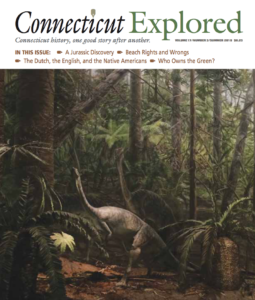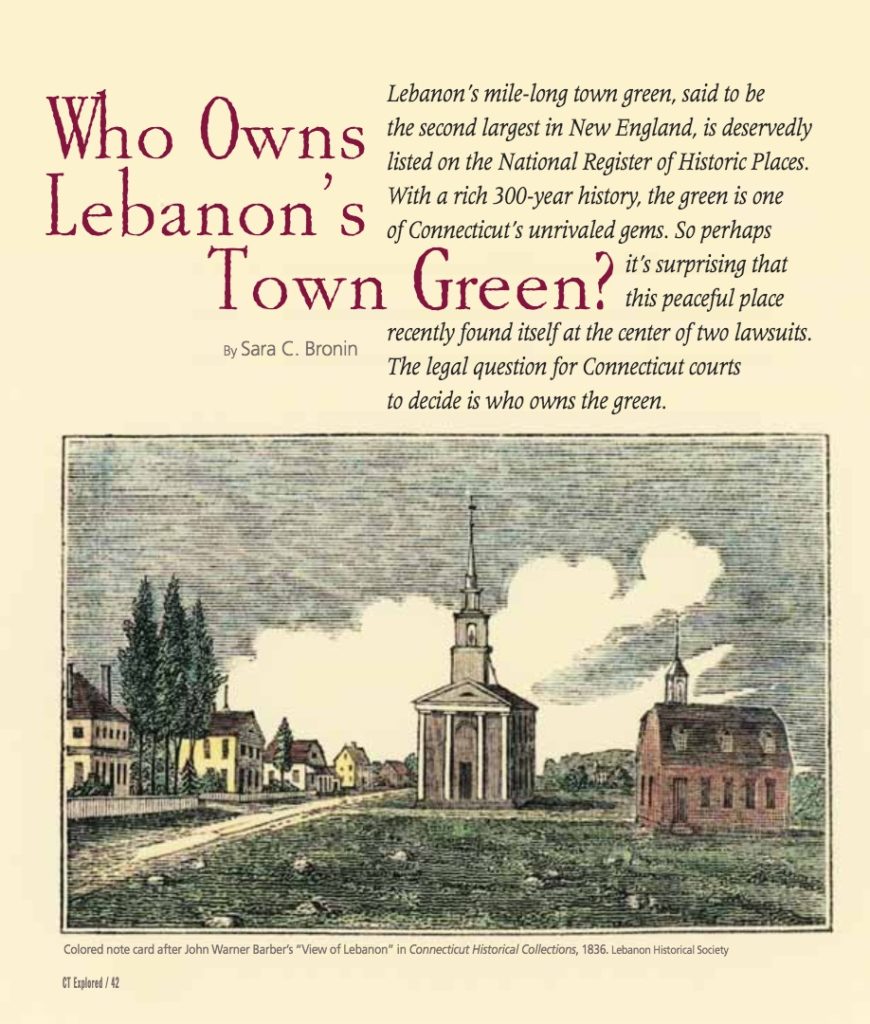(c) Connecticut Explored Inc. Summer 2019
Subscribe/Buy the Issue!
Lebanon’s mile-long town green, said to be the second largest in New England, is deservedly listed on the National Register of Historic Places. Rich with a 300-year history, the green is one of Connecticut’s unrivaled gems. So perhaps it’s surprising that this peaceful place recently found itself at the center of two lawsuits. The legal question for Connecticut courts to decide, is who owns the green.
The ownership question arose when the Town of Lebanon proposed an expansion of its library, located in the southeast corner of the green, in 2015. To authorize a grant to the town, the State of Connecticut required proof of ownership of the underlying land.
No such proof could be found. There was speculation that adjacent property owners, or maybe descendants of Lebanon’s first families, held ownership rights. But legal research revealed that the last known owners of the green—including the library, the church, and other buildings and improvements—were the 51 proprietors of Lebanon in 1705. (The term “proprietor” refers to individuals who jointly acquire and then disburse large tracts of land.)
If it were easy to identify the heirs and assigns of the 51 proprietors, then resolution of the ownership question would be simple. But finding proof of inheritance—across as many as 16 generations—would be impossible, given the poor quality of record-keeping in the 18th and 19th centuries.
In this situation, the only effective way to settle the ownership question is to ask a court to “quiet title.” In a quiet title action, a court decides who owns a piece of property and may place conditions on the new owners. In January 2018, the Town of Lebanon asked the court to quiet title to three parts of the green where the town hall, library, and public works facility are located. The legal theory was that the green was dedicated to the general public by the proprietors and their heirs and assigns. Public use of the property has endured without interruption for several centuries, and the Town of Lebanon has long assumed it had rights to maintain and use the green for public purposes. Because of this “public use” legal theory, the attorney general’s office was a necessary party. In addition, the Lebanon Historical Society, the First Congregational Church of Lebanon, and a charitable trust created by long-time Lebanon benefactor Hugh Trumbull Adams were named as defendants.
In March 2019 a judge ruled that the Town of Lebanon owned these three parts of the green. In addition, the court granted a request by the historical society, aided by the Connecticut Trust for Historic Preservation, to include conservation and preservation restrictions on the town hall and library parcels. These restrictions establish the appropriate uses and development of these parcels, consistent with the way the green has been used for many years. They will ensure that this precious resource will continue to be preserved for centuries to come.
 A second lawsuit was filed in January 2019 by Lebanon Historical Society to resolve quiet title to the rest of the green and to ensure its long-term protection through conservation and preservation restrictions. The historical society is asking that the vast northern expanse of largely unimproved area, encompassing just over 30 acres, be deeded to the town, that a corner of the green occupied by the First Congregational Church be deeded to the church, and that slivers of nearby property owners’ front yards—which they have long thought were their own—be deeded to those respective property owners. This lawsuit will take more time because there are more interests involved.
A second lawsuit was filed in January 2019 by Lebanon Historical Society to resolve quiet title to the rest of the green and to ensure its long-term protection through conservation and preservation restrictions. The historical society is asking that the vast northern expanse of largely unimproved area, encompassing just over 30 acres, be deeded to the town, that a corner of the green occupied by the First Congregational Church be deeded to the church, and that slivers of nearby property owners’ front yards—which they have long thought were their own—be deeded to those respective property owners. This lawsuit will take more time because there are more interests involved.
It is astonishing to think that such a significant part of our history was in legal limbo for centuries. Adding to the uniqueness of this “commons” is the necessary foray into Connecticut courts that ultimately will help safeguard it for generations to come.
Sara C. Bronin is a UConn School of Law professor who specializes in property and land-use law and represents Hugh Trumbull Adams’s charitable trust in the lawsuits.

